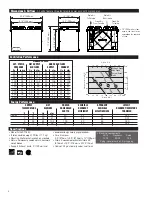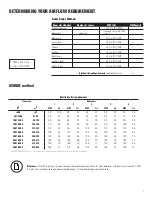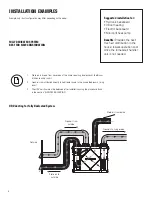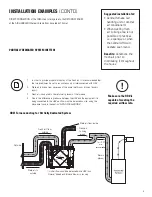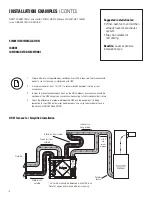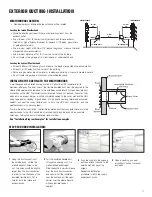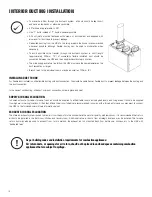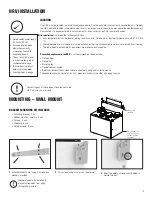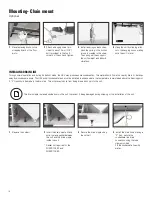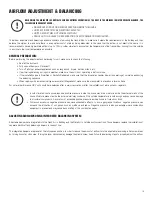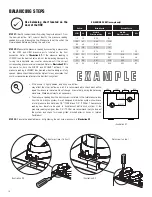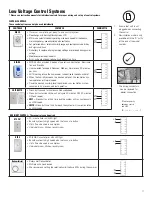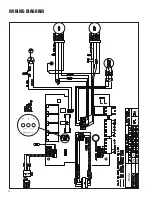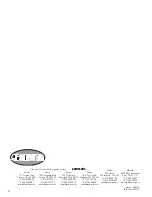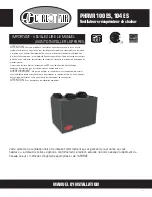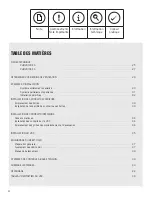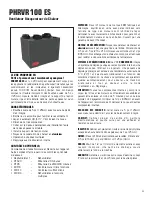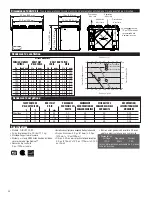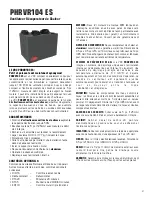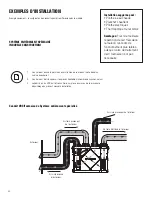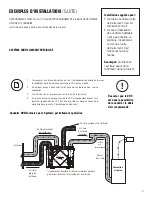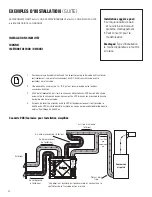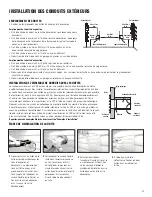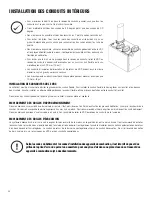
20
TROUBLESHOOTING
Problem
Causes
Solutions
Air is too dry
Dehumidistat control is set too low
Increase the desired level of humidity. Change ventilation mode from
continuous mode to standby.
HRV out of balance
Have contractor balance HRV airflows
Air is too humid
Dehumidistat control is set too high
Reduce the desired level of humidity. Combine this with the use of continuous
exchange mode.
Sudden change in temperature
Wait until outside temperature stabilizes (winter). Heating will also improve
situation.
Storing too much wood for heating
Store a majority of your wood outside. Even dried, a cord of wood contains
more than 20 gallons of water.
Dryer vent exhaust is inside home
Make sure the dryer vent is exhausting outside.
Poor air circulation near windows
Open curtains or blinds.
HRV out of balance
Have contractor balance HRV airflows
Well sealed basement door is closed
Open the door or install a grill on the door.
Failed damper system may be stuck in recirculation
mode
Check defrost damper. If damper is always blocking incoming fresh air, have
contractor verify damper system.
Persistent condensation
on window
Improper adjustment of dehumidistat control
Reduce the desired level of humidity. Combine this step with use of continuous
exchange mode.
HRV out of balance
Have contractor balance HRV
Poor air circulation near windows
Open curtains or blinds.
Poor Air Flows
1/4" (6mm) mesh on the outside hoods is plugged
Clean exterior hoods or vents
Filters plugged
Remove and clean filter
Core obstructed
Remove and clean core
Indoor grilles closed or blocked
Check and open grilles
Inadequate power supply at site
Have electrician check supply voltage
Ductwork is restricting airflow
Check duct installation
Improper speed control setting
Increase the speed of the HRV (i.e. change unit control from REDUCED to NORMAL
speed)
HRV airflow improperly balanced
Have contractor balance HRV airflows
Ducting has fallen down or been disconnected from HRV
Have contractor reconnect ducting
Supply air feels cold
Poor location of supply grilles, the airflow may irritate
the occupant
Locate the grilles high on the walls or under the baseboards, install ceiling
mounted diffuser or grilles so as not to directly spill the supply air on the
occupant (eg. Over a sofa)
Turn down the HRV supply speed. A small duct heater (1kw) could be used to
temper the supply air
Placement of furniture or closed doors is restricting the movement of air in
the home
Outdoor temperature extremely cold
If supply air is ducted into furnace return, the furnace fan may need to run
continuously to distribute ventilation air comfortably
HRV and/or Ducts frosting up
HRV air flows are improperly balanced
Have HVAC contractor balance the HRV airflows
Malfunction of the HRV defrost system
Note: minimal frost build-up is expected on the core before unit initiates
defrost cycle functions
Condensation or Ice Build Up in
Insulated Duct to the Outside
Incomplete vapor barrier around insulated duct
Tape and seal all joints
A hole or tear in outer duct covering
Tape any holes or tears made in the outer duct covering
Ensure that the vapor barrier is completely sealed.
LED is flashing
Everything is in good operations
LED is not flashing
No Power is being transmitted to the Control Board
Make sure unit is plugged.
Transformer may need replacing.
Note:
It is best to get the unit checked by a certified HVAC Contractor/Technician.

